Evaluative Report: Primary Nursing Plan for Mental Health Intervention
VerifiedAdded on 2023/06/09
|17
|4417
|350
Report
AI Summary
This evaluative report assesses the incorporation of a primary nursing plan in mental health to improve service delivery and patient satisfaction. It critiques the feasibility of this change, supported by literature, and proposes an action plan for effective implementation. The report addresses the limitations of the current functional nursing model, including employee turnover and communication issues, and highlights the importance of building trust with mental health patients. The proposed primary care model emphasizes cultural competency and specialized roles for nurses, aiming to distribute workload, improve patient care, and reduce complaints. The goal is to transform the healthcare organization's operations for better outcomes, supported by a framework of primary care in mental health nursing.
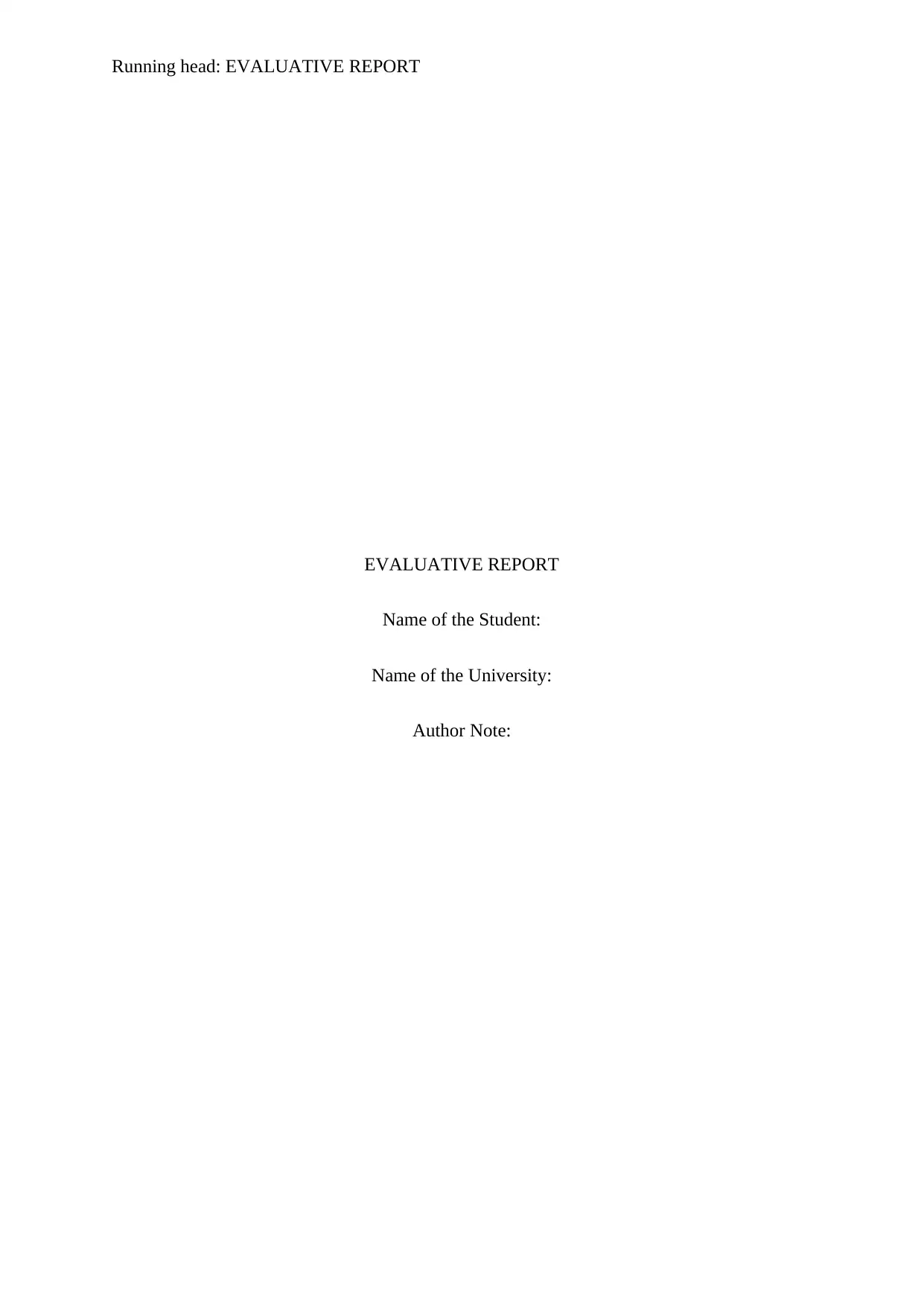
Running head: EVALUATIVE REPORT
EVALUATIVE REPORT
Name of the Student:
Name of the University:
Author Note:
EVALUATIVE REPORT
Name of the Student:
Name of the University:
Author Note:
Paraphrase This Document
Need a fresh take? Get an instant paraphrase of this document with our AI Paraphraser
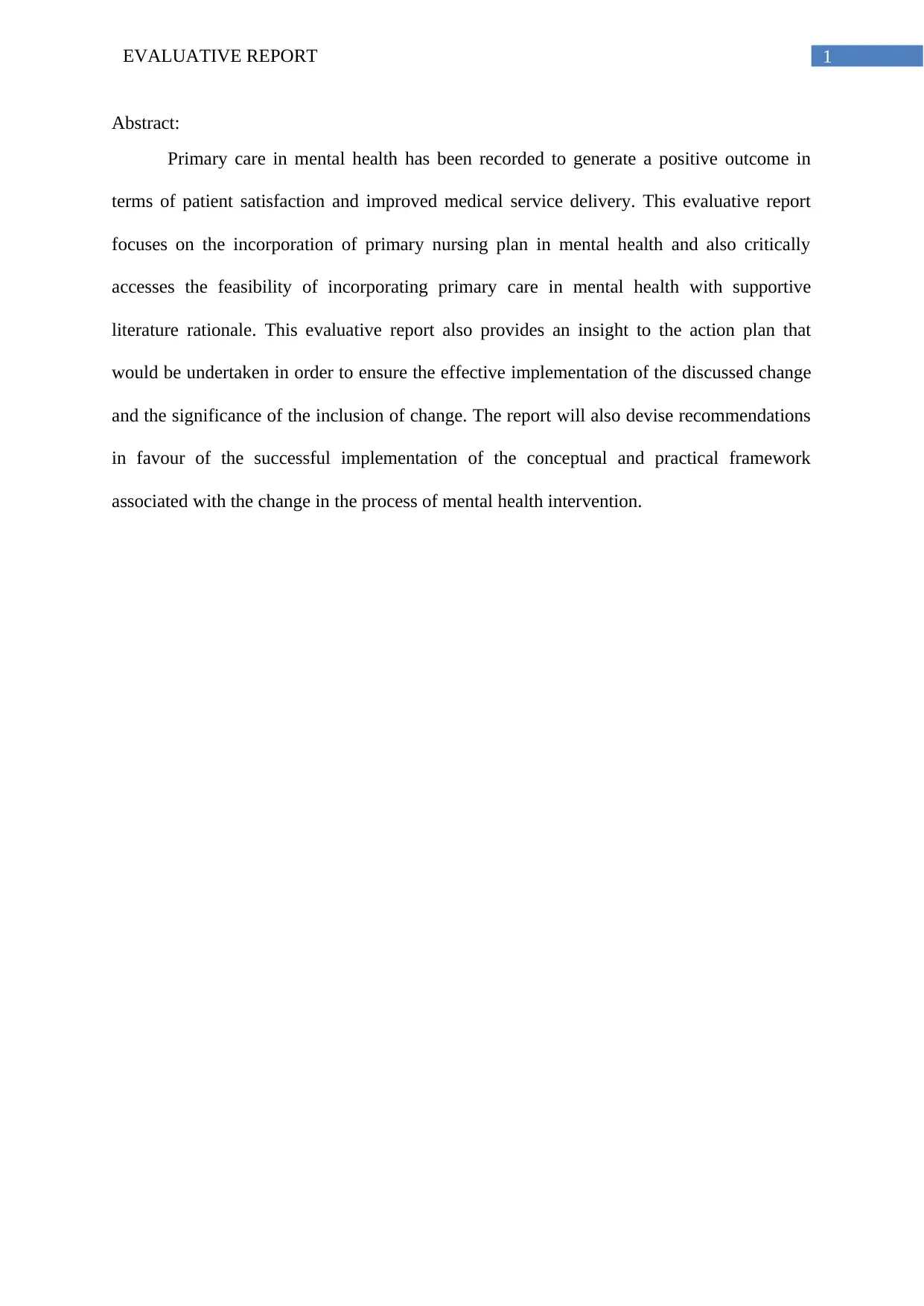
1EVALUATIVE REPORT
Abstract:
Primary care in mental health has been recorded to generate a positive outcome in
terms of patient satisfaction and improved medical service delivery. This evaluative report
focuses on the incorporation of primary nursing plan in mental health and also critically
accesses the feasibility of incorporating primary care in mental health with supportive
literature rationale. This evaluative report also provides an insight to the action plan that
would be undertaken in order to ensure the effective implementation of the discussed change
and the significance of the inclusion of change. The report will also devise recommendations
in favour of the successful implementation of the conceptual and practical framework
associated with the change in the process of mental health intervention.
Abstract:
Primary care in mental health has been recorded to generate a positive outcome in
terms of patient satisfaction and improved medical service delivery. This evaluative report
focuses on the incorporation of primary nursing plan in mental health and also critically
accesses the feasibility of incorporating primary care in mental health with supportive
literature rationale. This evaluative report also provides an insight to the action plan that
would be undertaken in order to ensure the effective implementation of the discussed change
and the significance of the inclusion of change. The report will also devise recommendations
in favour of the successful implementation of the conceptual and practical framework
associated with the change in the process of mental health intervention.
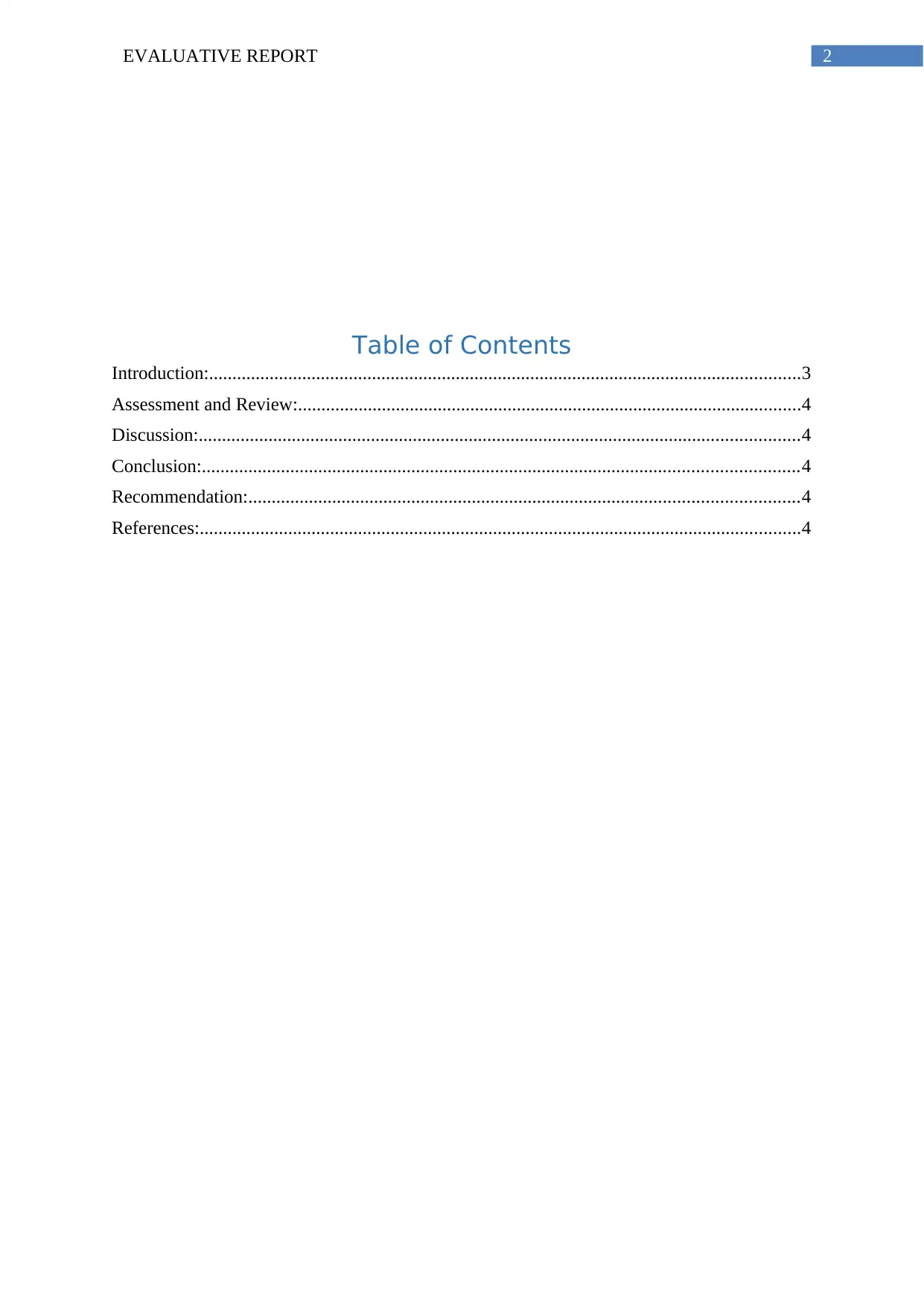
2EVALUATIVE REPORT
Table of Contents
Introduction:...............................................................................................................................3
Assessment and Review:............................................................................................................4
Discussion:.................................................................................................................................4
Conclusion:................................................................................................................................4
Recommendation:......................................................................................................................4
References:.................................................................................................................................4
Table of Contents
Introduction:...............................................................................................................................3
Assessment and Review:............................................................................................................4
Discussion:.................................................................................................................................4
Conclusion:................................................................................................................................4
Recommendation:......................................................................................................................4
References:.................................................................................................................................4
⊘ This is a preview!⊘
Do you want full access?
Subscribe today to unlock all pages.

Trusted by 1+ million students worldwide
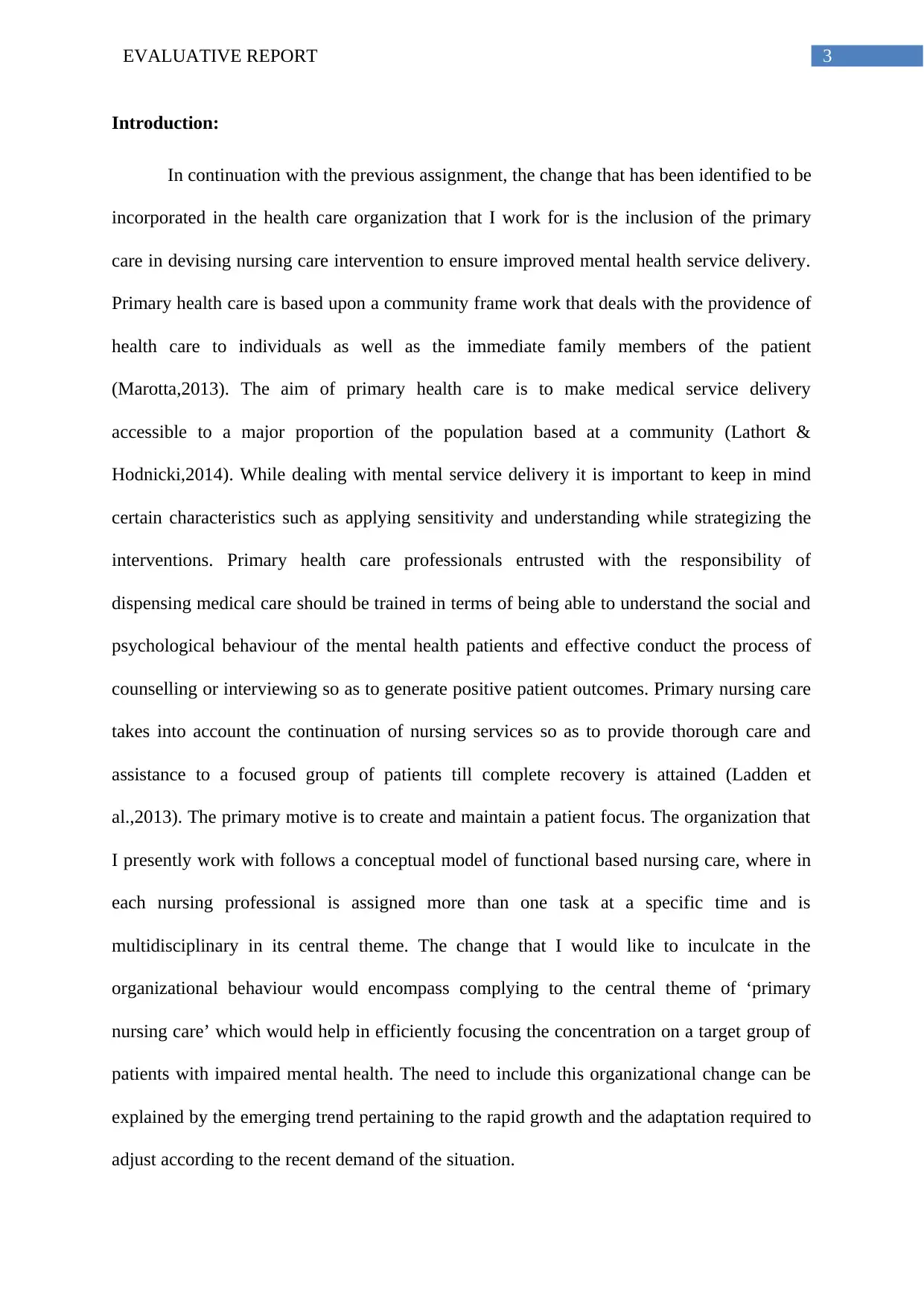
3EVALUATIVE REPORT
Introduction:
In continuation with the previous assignment, the change that has been identified to be
incorporated in the health care organization that I work for is the inclusion of the primary
care in devising nursing care intervention to ensure improved mental health service delivery.
Primary health care is based upon a community frame work that deals with the providence of
health care to individuals as well as the immediate family members of the patient
(Marotta,2013). The aim of primary health care is to make medical service delivery
accessible to a major proportion of the population based at a community (Lathort &
Hodnicki,2014). While dealing with mental service delivery it is important to keep in mind
certain characteristics such as applying sensitivity and understanding while strategizing the
interventions. Primary health care professionals entrusted with the responsibility of
dispensing medical care should be trained in terms of being able to understand the social and
psychological behaviour of the mental health patients and effective conduct the process of
counselling or interviewing so as to generate positive patient outcomes. Primary nursing care
takes into account the continuation of nursing services so as to provide thorough care and
assistance to a focused group of patients till complete recovery is attained (Ladden et
al.,2013). The primary motive is to create and maintain a patient focus. The organization that
I presently work with follows a conceptual model of functional based nursing care, where in
each nursing professional is assigned more than one task at a specific time and is
multidisciplinary in its central theme. The change that I would like to inculcate in the
organizational behaviour would encompass complying to the central theme of ‘primary
nursing care’ which would help in efficiently focusing the concentration on a target group of
patients with impaired mental health. The need to include this organizational change can be
explained by the emerging trend pertaining to the rapid growth and the adaptation required to
adjust according to the recent demand of the situation.
Introduction:
In continuation with the previous assignment, the change that has been identified to be
incorporated in the health care organization that I work for is the inclusion of the primary
care in devising nursing care intervention to ensure improved mental health service delivery.
Primary health care is based upon a community frame work that deals with the providence of
health care to individuals as well as the immediate family members of the patient
(Marotta,2013). The aim of primary health care is to make medical service delivery
accessible to a major proportion of the population based at a community (Lathort &
Hodnicki,2014). While dealing with mental service delivery it is important to keep in mind
certain characteristics such as applying sensitivity and understanding while strategizing the
interventions. Primary health care professionals entrusted with the responsibility of
dispensing medical care should be trained in terms of being able to understand the social and
psychological behaviour of the mental health patients and effective conduct the process of
counselling or interviewing so as to generate positive patient outcomes. Primary nursing care
takes into account the continuation of nursing services so as to provide thorough care and
assistance to a focused group of patients till complete recovery is attained (Ladden et
al.,2013). The primary motive is to create and maintain a patient focus. The organization that
I presently work with follows a conceptual model of functional based nursing care, where in
each nursing professional is assigned more than one task at a specific time and is
multidisciplinary in its central theme. The change that I would like to inculcate in the
organizational behaviour would encompass complying to the central theme of ‘primary
nursing care’ which would help in efficiently focusing the concentration on a target group of
patients with impaired mental health. The need to include this organizational change can be
explained by the emerging trend pertaining to the rapid growth and the adaptation required to
adjust according to the recent demand of the situation.
Paraphrase This Document
Need a fresh take? Get an instant paraphrase of this document with our AI Paraphraser
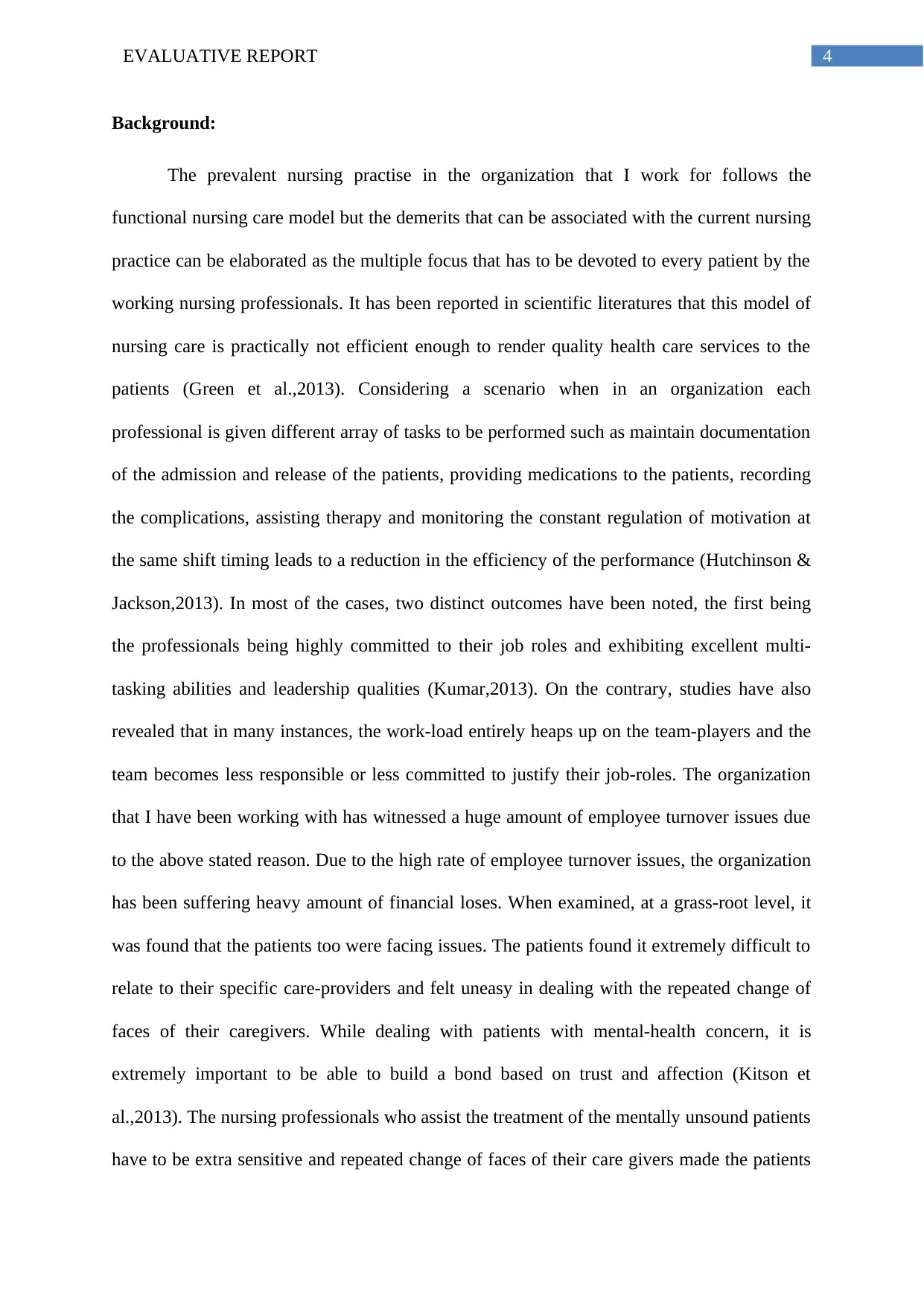
4EVALUATIVE REPORT
Background:
The prevalent nursing practise in the organization that I work for follows the
functional nursing care model but the demerits that can be associated with the current nursing
practice can be elaborated as the multiple focus that has to be devoted to every patient by the
working nursing professionals. It has been reported in scientific literatures that this model of
nursing care is practically not efficient enough to render quality health care services to the
patients (Green et al.,2013). Considering a scenario when in an organization each
professional is given different array of tasks to be performed such as maintain documentation
of the admission and release of the patients, providing medications to the patients, recording
the complications, assisting therapy and monitoring the constant regulation of motivation at
the same shift timing leads to a reduction in the efficiency of the performance (Hutchinson &
Jackson,2013). In most of the cases, two distinct outcomes have been noted, the first being
the professionals being highly committed to their job roles and exhibiting excellent multi-
tasking abilities and leadership qualities (Kumar,2013). On the contrary, studies have also
revealed that in many instances, the work-load entirely heaps up on the team-players and the
team becomes less responsible or less committed to justify their job-roles. The organization
that I have been working with has witnessed a huge amount of employee turnover issues due
to the above stated reason. Due to the high rate of employee turnover issues, the organization
has been suffering heavy amount of financial loses. When examined, at a grass-root level, it
was found that the patients too were facing issues. The patients found it extremely difficult to
relate to their specific care-providers and felt uneasy in dealing with the repeated change of
faces of their caregivers. While dealing with patients with mental-health concern, it is
extremely important to be able to build a bond based on trust and affection (Kitson et
al.,2013). The nursing professionals who assist the treatment of the mentally unsound patients
have to be extra sensitive and repeated change of faces of their care givers made the patients
Background:
The prevalent nursing practise in the organization that I work for follows the
functional nursing care model but the demerits that can be associated with the current nursing
practice can be elaborated as the multiple focus that has to be devoted to every patient by the
working nursing professionals. It has been reported in scientific literatures that this model of
nursing care is practically not efficient enough to render quality health care services to the
patients (Green et al.,2013). Considering a scenario when in an organization each
professional is given different array of tasks to be performed such as maintain documentation
of the admission and release of the patients, providing medications to the patients, recording
the complications, assisting therapy and monitoring the constant regulation of motivation at
the same shift timing leads to a reduction in the efficiency of the performance (Hutchinson &
Jackson,2013). In most of the cases, two distinct outcomes have been noted, the first being
the professionals being highly committed to their job roles and exhibiting excellent multi-
tasking abilities and leadership qualities (Kumar,2013). On the contrary, studies have also
revealed that in many instances, the work-load entirely heaps up on the team-players and the
team becomes less responsible or less committed to justify their job-roles. The organization
that I have been working with has witnessed a huge amount of employee turnover issues due
to the above stated reason. Due to the high rate of employee turnover issues, the organization
has been suffering heavy amount of financial loses. When examined, at a grass-root level, it
was found that the patients too were facing issues. The patients found it extremely difficult to
relate to their specific care-providers and felt uneasy in dealing with the repeated change of
faces of their caregivers. While dealing with patients with mental-health concern, it is
extremely important to be able to build a bond based on trust and affection (Kitson et
al.,2013). The nursing professionals who assist the treatment of the mentally unsound patients
have to be extra sensitive and repeated change of faces of their care givers made the patients
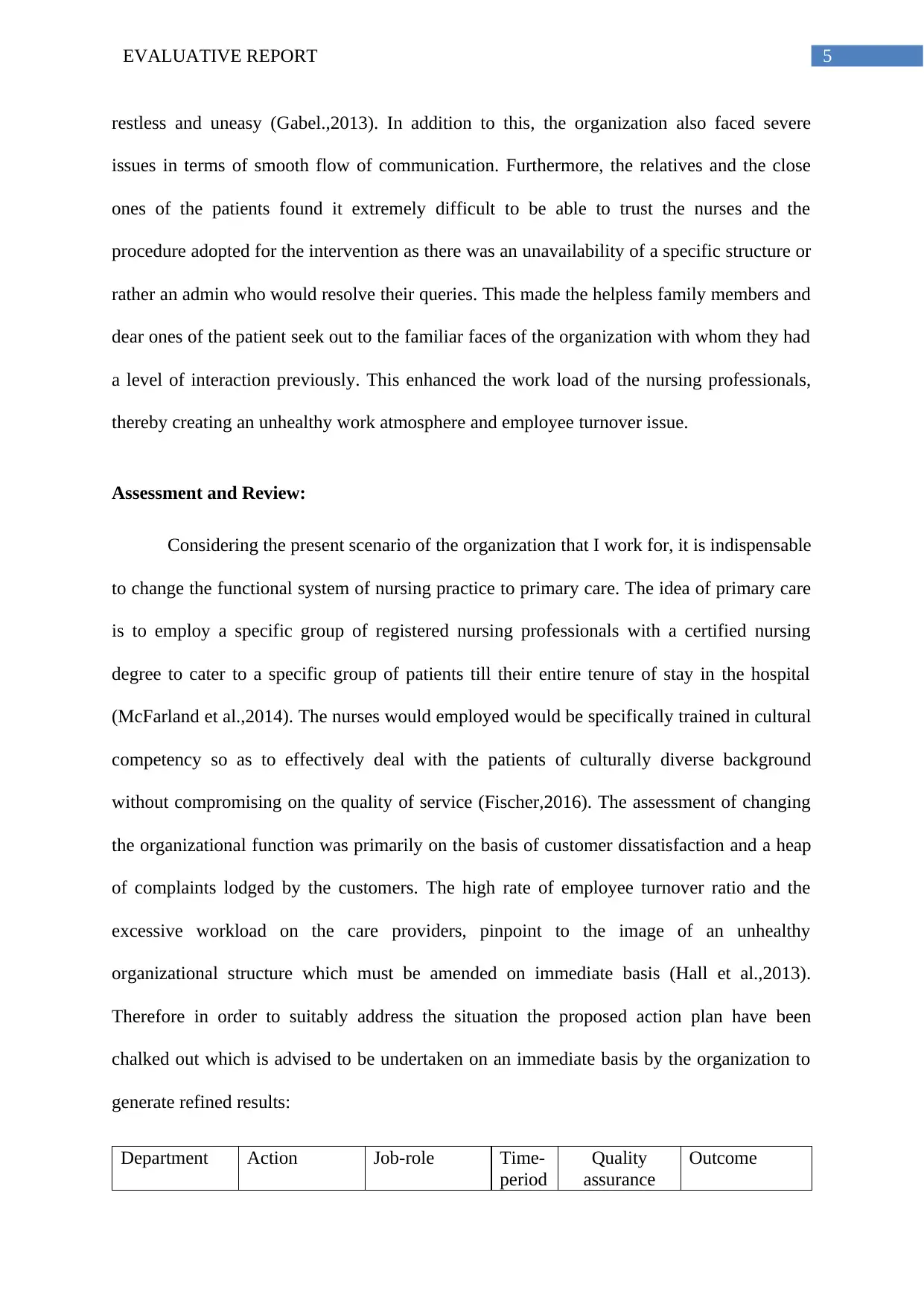
5EVALUATIVE REPORT
restless and uneasy (Gabel.,2013). In addition to this, the organization also faced severe
issues in terms of smooth flow of communication. Furthermore, the relatives and the close
ones of the patients found it extremely difficult to be able to trust the nurses and the
procedure adopted for the intervention as there was an unavailability of a specific structure or
rather an admin who would resolve their queries. This made the helpless family members and
dear ones of the patient seek out to the familiar faces of the organization with whom they had
a level of interaction previously. This enhanced the work load of the nursing professionals,
thereby creating an unhealthy work atmosphere and employee turnover issue.
Assessment and Review:
Considering the present scenario of the organization that I work for, it is indispensable
to change the functional system of nursing practice to primary care. The idea of primary care
is to employ a specific group of registered nursing professionals with a certified nursing
degree to cater to a specific group of patients till their entire tenure of stay in the hospital
(McFarland et al.,2014). The nurses would employed would be specifically trained in cultural
competency so as to effectively deal with the patients of culturally diverse background
without compromising on the quality of service (Fischer,2016). The assessment of changing
the organizational function was primarily on the basis of customer dissatisfaction and a heap
of complaints lodged by the customers. The high rate of employee turnover ratio and the
excessive workload on the care providers, pinpoint to the image of an unhealthy
organizational structure which must be amended on immediate basis (Hall et al.,2013).
Therefore in order to suitably address the situation the proposed action plan have been
chalked out which is advised to be undertaken on an immediate basis by the organization to
generate refined results:
Department Action Job-role Time-
period
Quality
assurance
Outcome
restless and uneasy (Gabel.,2013). In addition to this, the organization also faced severe
issues in terms of smooth flow of communication. Furthermore, the relatives and the close
ones of the patients found it extremely difficult to be able to trust the nurses and the
procedure adopted for the intervention as there was an unavailability of a specific structure or
rather an admin who would resolve their queries. This made the helpless family members and
dear ones of the patient seek out to the familiar faces of the organization with whom they had
a level of interaction previously. This enhanced the work load of the nursing professionals,
thereby creating an unhealthy work atmosphere and employee turnover issue.
Assessment and Review:
Considering the present scenario of the organization that I work for, it is indispensable
to change the functional system of nursing practice to primary care. The idea of primary care
is to employ a specific group of registered nursing professionals with a certified nursing
degree to cater to a specific group of patients till their entire tenure of stay in the hospital
(McFarland et al.,2014). The nurses would employed would be specifically trained in cultural
competency so as to effectively deal with the patients of culturally diverse background
without compromising on the quality of service (Fischer,2016). The assessment of changing
the organizational function was primarily on the basis of customer dissatisfaction and a heap
of complaints lodged by the customers. The high rate of employee turnover ratio and the
excessive workload on the care providers, pinpoint to the image of an unhealthy
organizational structure which must be amended on immediate basis (Hall et al.,2013).
Therefore in order to suitably address the situation the proposed action plan have been
chalked out which is advised to be undertaken on an immediate basis by the organization to
generate refined results:
Department Action Job-role Time-
period
Quality
assurance
Outcome
⊘ This is a preview!⊘
Do you want full access?
Subscribe today to unlock all pages.

Trusted by 1+ million students worldwide
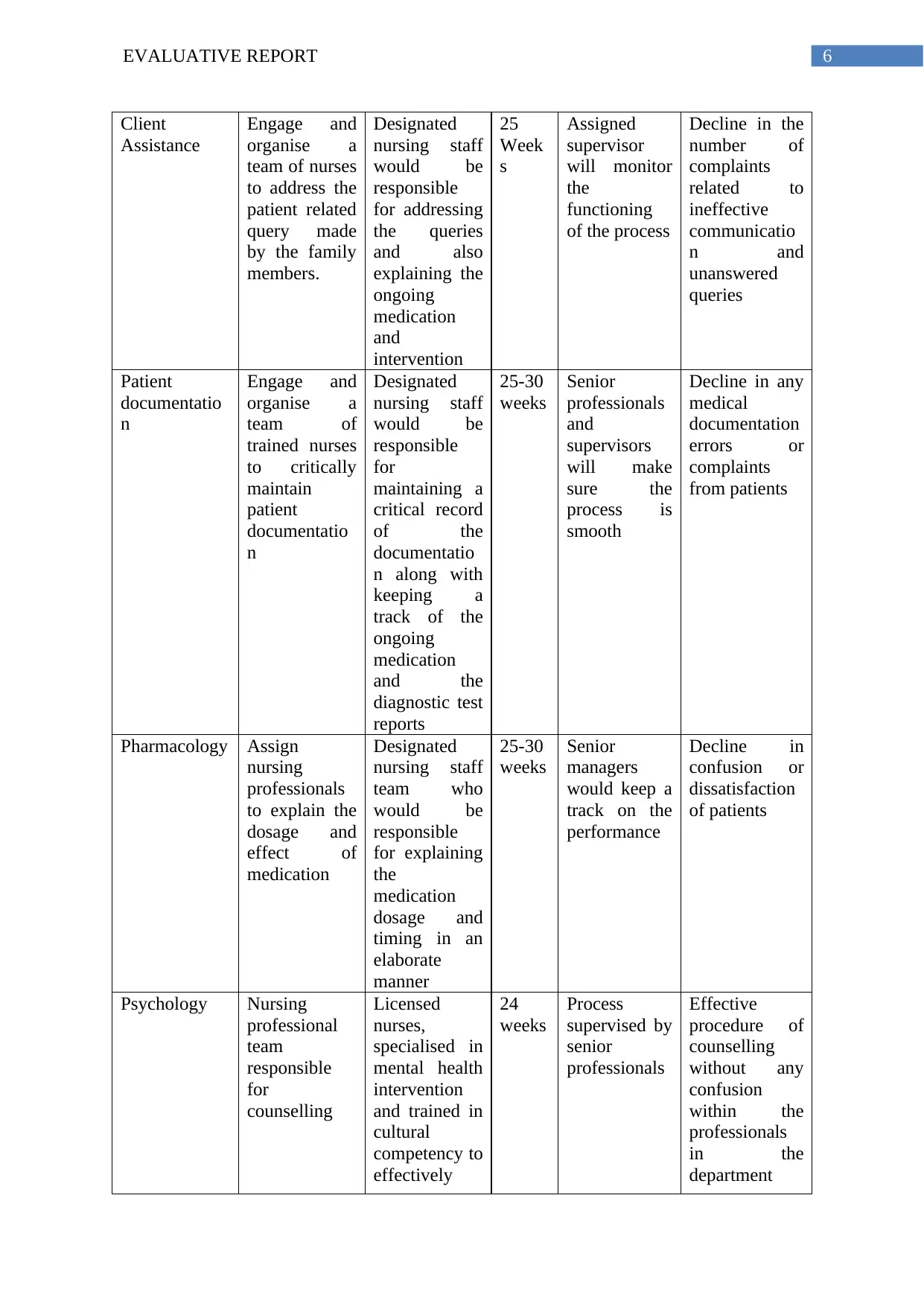
6EVALUATIVE REPORT
Client
Assistance
Engage and
organise a
team of nurses
to address the
patient related
query made
by the family
members.
Designated
nursing staff
would be
responsible
for addressing
the queries
and also
explaining the
ongoing
medication
and
intervention
25
Week
s
Assigned
supervisor
will monitor
the
functioning
of the process
Decline in the
number of
complaints
related to
ineffective
communicatio
n and
unanswered
queries
Patient
documentatio
n
Engage and
organise a
team of
trained nurses
to critically
maintain
patient
documentatio
n
Designated
nursing staff
would be
responsible
for
maintaining a
critical record
of the
documentatio
n along with
keeping a
track of the
ongoing
medication
and the
diagnostic test
reports
25-30
weeks
Senior
professionals
and
supervisors
will make
sure the
process is
smooth
Decline in any
medical
documentation
errors or
complaints
from patients
Pharmacology Assign
nursing
professionals
to explain the
dosage and
effect of
medication
Designated
nursing staff
team who
would be
responsible
for explaining
the
medication
dosage and
timing in an
elaborate
manner
25-30
weeks
Senior
managers
would keep a
track on the
performance
Decline in
confusion or
dissatisfaction
of patients
Psychology Nursing
professional
team
responsible
for
counselling
Licensed
nurses,
specialised in
mental health
intervention
and trained in
cultural
competency to
effectively
24
weeks
Process
supervised by
senior
professionals
Effective
procedure of
counselling
without any
confusion
within the
professionals
in the
department
Client
Assistance
Engage and
organise a
team of nurses
to address the
patient related
query made
by the family
members.
Designated
nursing staff
would be
responsible
for addressing
the queries
and also
explaining the
ongoing
medication
and
intervention
25
Week
s
Assigned
supervisor
will monitor
the
functioning
of the process
Decline in the
number of
complaints
related to
ineffective
communicatio
n and
unanswered
queries
Patient
documentatio
n
Engage and
organise a
team of
trained nurses
to critically
maintain
patient
documentatio
n
Designated
nursing staff
would be
responsible
for
maintaining a
critical record
of the
documentatio
n along with
keeping a
track of the
ongoing
medication
and the
diagnostic test
reports
25-30
weeks
Senior
professionals
and
supervisors
will make
sure the
process is
smooth
Decline in any
medical
documentation
errors or
complaints
from patients
Pharmacology Assign
nursing
professionals
to explain the
dosage and
effect of
medication
Designated
nursing staff
team who
would be
responsible
for explaining
the
medication
dosage and
timing in an
elaborate
manner
25-30
weeks
Senior
managers
would keep a
track on the
performance
Decline in
confusion or
dissatisfaction
of patients
Psychology Nursing
professional
team
responsible
for
counselling
Licensed
nurses,
specialised in
mental health
intervention
and trained in
cultural
competency to
effectively
24
weeks
Process
supervised by
senior
professionals
Effective
procedure of
counselling
without any
confusion
within the
professionals
in the
department
Paraphrase This Document
Need a fresh take? Get an instant paraphrase of this document with our AI Paraphraser
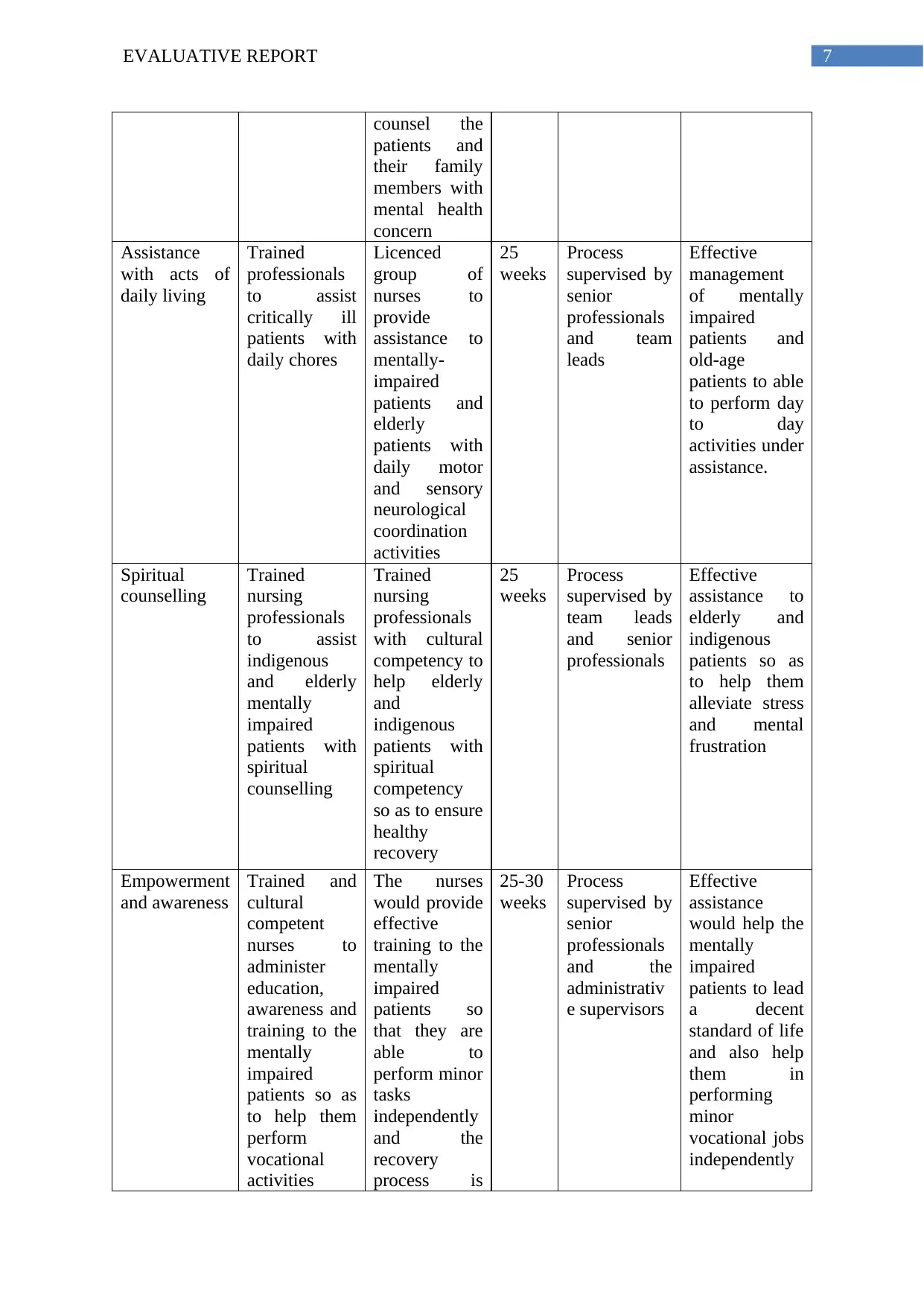
7EVALUATIVE REPORT
counsel the
patients and
their family
members with
mental health
concern
Assistance
with acts of
daily living
Trained
professionals
to assist
critically ill
patients with
daily chores
Licenced
group of
nurses to
provide
assistance to
mentally-
impaired
patients and
elderly
patients with
daily motor
and sensory
neurological
coordination
activities
25
weeks
Process
supervised by
senior
professionals
and team
leads
Effective
management
of mentally
impaired
patients and
old-age
patients to able
to perform day
to day
activities under
assistance.
Spiritual
counselling
Trained
nursing
professionals
to assist
indigenous
and elderly
mentally
impaired
patients with
spiritual
counselling
Trained
nursing
professionals
with cultural
competency to
help elderly
and
indigenous
patients with
spiritual
competency
so as to ensure
healthy
recovery
25
weeks
Process
supervised by
team leads
and senior
professionals
Effective
assistance to
elderly and
indigenous
patients so as
to help them
alleviate stress
and mental
frustration
Empowerment
and awareness
Trained and
cultural
competent
nurses to
administer
education,
awareness and
training to the
mentally
impaired
patients so as
to help them
perform
vocational
activities
The nurses
would provide
effective
training to the
mentally
impaired
patients so
that they are
able to
perform minor
tasks
independently
and the
recovery
process is
25-30
weeks
Process
supervised by
senior
professionals
and the
administrativ
e supervisors
Effective
assistance
would help the
mentally
impaired
patients to lead
a decent
standard of life
and also help
them in
performing
minor
vocational jobs
independently
counsel the
patients and
their family
members with
mental health
concern
Assistance
with acts of
daily living
Trained
professionals
to assist
critically ill
patients with
daily chores
Licenced
group of
nurses to
provide
assistance to
mentally-
impaired
patients and
elderly
patients with
daily motor
and sensory
neurological
coordination
activities
25
weeks
Process
supervised by
senior
professionals
and team
leads
Effective
management
of mentally
impaired
patients and
old-age
patients to able
to perform day
to day
activities under
assistance.
Spiritual
counselling
Trained
nursing
professionals
to assist
indigenous
and elderly
mentally
impaired
patients with
spiritual
counselling
Trained
nursing
professionals
with cultural
competency to
help elderly
and
indigenous
patients with
spiritual
competency
so as to ensure
healthy
recovery
25
weeks
Process
supervised by
team leads
and senior
professionals
Effective
assistance to
elderly and
indigenous
patients so as
to help them
alleviate stress
and mental
frustration
Empowerment
and awareness
Trained and
cultural
competent
nurses to
administer
education,
awareness and
training to the
mentally
impaired
patients so as
to help them
perform
vocational
activities
The nurses
would provide
effective
training to the
mentally
impaired
patients so
that they are
able to
perform minor
tasks
independently
and the
recovery
process is
25-30
weeks
Process
supervised by
senior
professionals
and the
administrativ
e supervisors
Effective
assistance
would help the
mentally
impaired
patients to lead
a decent
standard of life
and also help
them in
performing
minor
vocational jobs
independently
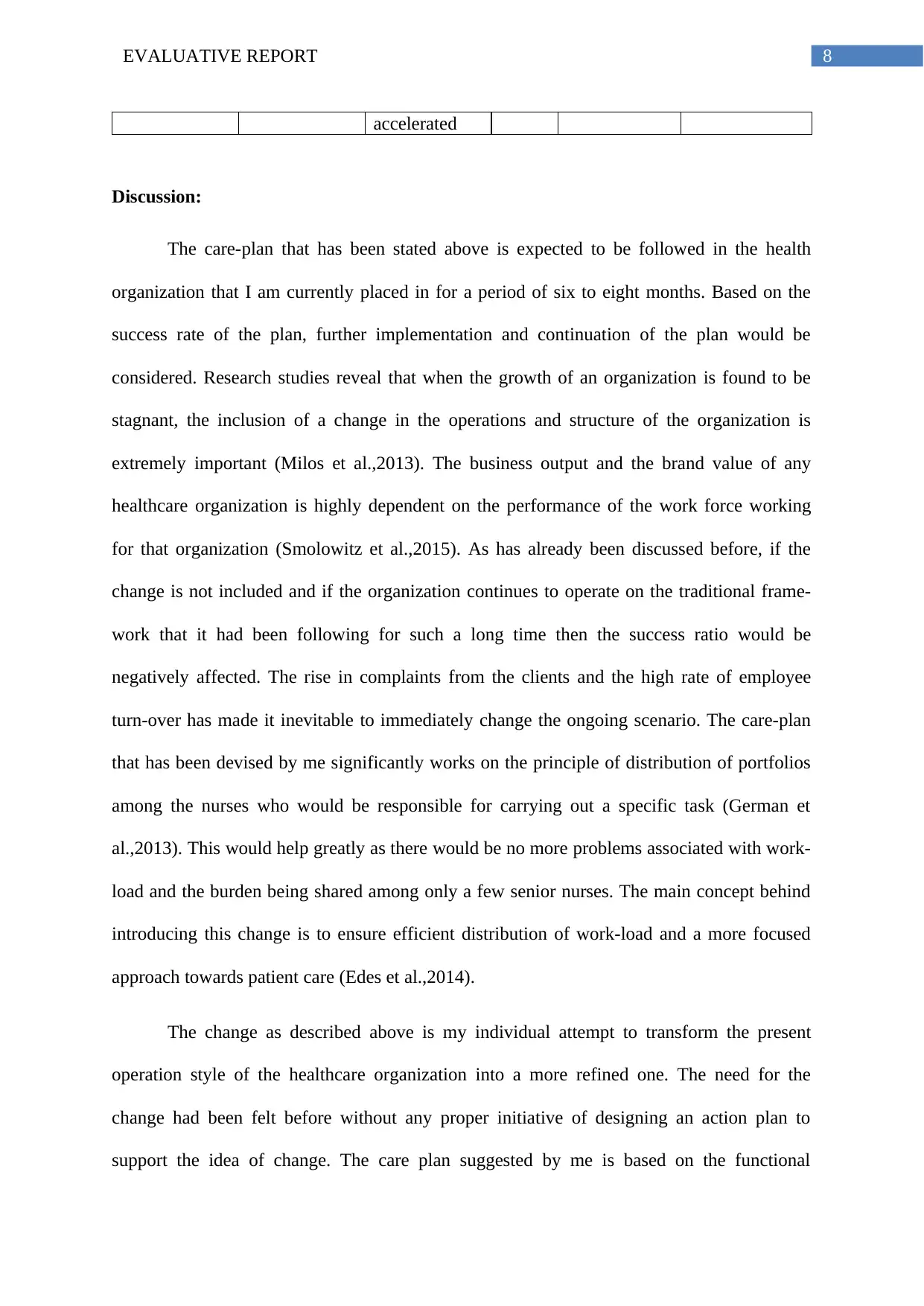
8EVALUATIVE REPORT
accelerated
Discussion:
The care-plan that has been stated above is expected to be followed in the health
organization that I am currently placed in for a period of six to eight months. Based on the
success rate of the plan, further implementation and continuation of the plan would be
considered. Research studies reveal that when the growth of an organization is found to be
stagnant, the inclusion of a change in the operations and structure of the organization is
extremely important (Milos et al.,2013). The business output and the brand value of any
healthcare organization is highly dependent on the performance of the work force working
for that organization (Smolowitz et al.,2015). As has already been discussed before, if the
change is not included and if the organization continues to operate on the traditional frame-
work that it had been following for such a long time then the success ratio would be
negatively affected. The rise in complaints from the clients and the high rate of employee
turn-over has made it inevitable to immediately change the ongoing scenario. The care-plan
that has been devised by me significantly works on the principle of distribution of portfolios
among the nurses who would be responsible for carrying out a specific task (German et
al.,2013). This would help greatly as there would be no more problems associated with work-
load and the burden being shared among only a few senior nurses. The main concept behind
introducing this change is to ensure efficient distribution of work-load and a more focused
approach towards patient care (Edes et al.,2014).
The change as described above is my individual attempt to transform the present
operation style of the healthcare organization into a more refined one. The need for the
change had been felt before without any proper initiative of designing an action plan to
support the idea of change. The care plan suggested by me is based on the functional
accelerated
Discussion:
The care-plan that has been stated above is expected to be followed in the health
organization that I am currently placed in for a period of six to eight months. Based on the
success rate of the plan, further implementation and continuation of the plan would be
considered. Research studies reveal that when the growth of an organization is found to be
stagnant, the inclusion of a change in the operations and structure of the organization is
extremely important (Milos et al.,2013). The business output and the brand value of any
healthcare organization is highly dependent on the performance of the work force working
for that organization (Smolowitz et al.,2015). As has already been discussed before, if the
change is not included and if the organization continues to operate on the traditional frame-
work that it had been following for such a long time then the success ratio would be
negatively affected. The rise in complaints from the clients and the high rate of employee
turn-over has made it inevitable to immediately change the ongoing scenario. The care-plan
that has been devised by me significantly works on the principle of distribution of portfolios
among the nurses who would be responsible for carrying out a specific task (German et
al.,2013). This would help greatly as there would be no more problems associated with work-
load and the burden being shared among only a few senior nurses. The main concept behind
introducing this change is to ensure efficient distribution of work-load and a more focused
approach towards patient care (Edes et al.,2014).
The change as described above is my individual attempt to transform the present
operation style of the healthcare organization into a more refined one. The need for the
change had been felt before without any proper initiative of designing an action plan to
support the idea of change. The care plan suggested by me is based on the functional
⊘ This is a preview!⊘
Do you want full access?
Subscribe today to unlock all pages.

Trusted by 1+ million students worldwide
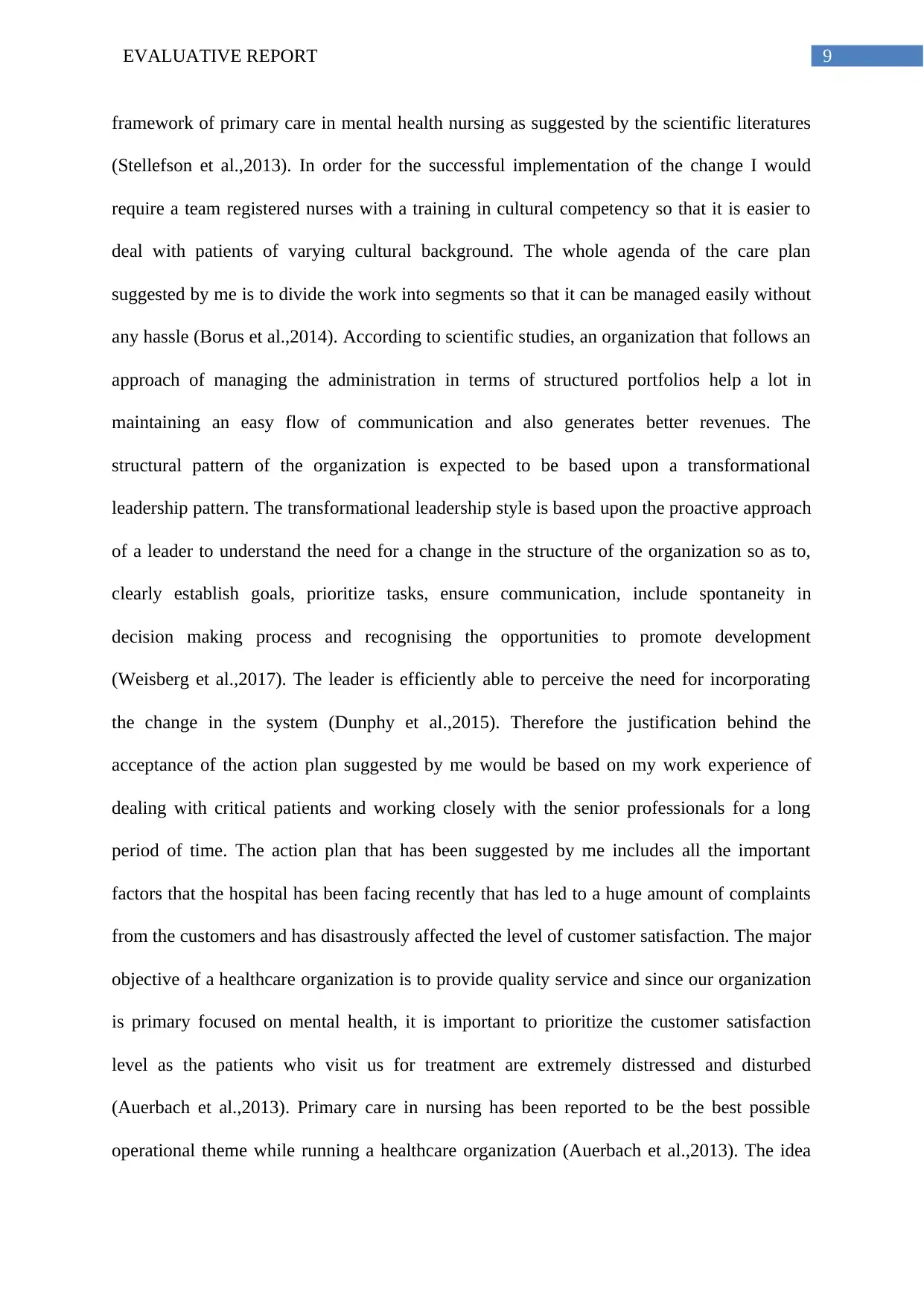
9EVALUATIVE REPORT
framework of primary care in mental health nursing as suggested by the scientific literatures
(Stellefson et al.,2013). In order for the successful implementation of the change I would
require a team registered nurses with a training in cultural competency so that it is easier to
deal with patients of varying cultural background. The whole agenda of the care plan
suggested by me is to divide the work into segments so that it can be managed easily without
any hassle (Borus et al.,2014). According to scientific studies, an organization that follows an
approach of managing the administration in terms of structured portfolios help a lot in
maintaining an easy flow of communication and also generates better revenues. The
structural pattern of the organization is expected to be based upon a transformational
leadership pattern. The transformational leadership style is based upon the proactive approach
of a leader to understand the need for a change in the structure of the organization so as to,
clearly establish goals, prioritize tasks, ensure communication, include spontaneity in
decision making process and recognising the opportunities to promote development
(Weisberg et al.,2017). The leader is efficiently able to perceive the need for incorporating
the change in the system (Dunphy et al.,2015). Therefore the justification behind the
acceptance of the action plan suggested by me would be based on my work experience of
dealing with critical patients and working closely with the senior professionals for a long
period of time. The action plan that has been suggested by me includes all the important
factors that the hospital has been facing recently that has led to a huge amount of complaints
from the customers and has disastrously affected the level of customer satisfaction. The major
objective of a healthcare organization is to provide quality service and since our organization
is primary focused on mental health, it is important to prioritize the customer satisfaction
level as the patients who visit us for treatment are extremely distressed and disturbed
(Auerbach et al.,2013). Primary care in nursing has been reported to be the best possible
operational theme while running a healthcare organization (Auerbach et al.,2013). The idea
framework of primary care in mental health nursing as suggested by the scientific literatures
(Stellefson et al.,2013). In order for the successful implementation of the change I would
require a team registered nurses with a training in cultural competency so that it is easier to
deal with patients of varying cultural background. The whole agenda of the care plan
suggested by me is to divide the work into segments so that it can be managed easily without
any hassle (Borus et al.,2014). According to scientific studies, an organization that follows an
approach of managing the administration in terms of structured portfolios help a lot in
maintaining an easy flow of communication and also generates better revenues. The
structural pattern of the organization is expected to be based upon a transformational
leadership pattern. The transformational leadership style is based upon the proactive approach
of a leader to understand the need for a change in the structure of the organization so as to,
clearly establish goals, prioritize tasks, ensure communication, include spontaneity in
decision making process and recognising the opportunities to promote development
(Weisberg et al.,2017). The leader is efficiently able to perceive the need for incorporating
the change in the system (Dunphy et al.,2015). Therefore the justification behind the
acceptance of the action plan suggested by me would be based on my work experience of
dealing with critical patients and working closely with the senior professionals for a long
period of time. The action plan that has been suggested by me includes all the important
factors that the hospital has been facing recently that has led to a huge amount of complaints
from the customers and has disastrously affected the level of customer satisfaction. The major
objective of a healthcare organization is to provide quality service and since our organization
is primary focused on mental health, it is important to prioritize the customer satisfaction
level as the patients who visit us for treatment are extremely distressed and disturbed
(Auerbach et al.,2013). Primary care in nursing has been reported to be the best possible
operational theme while running a healthcare organization (Auerbach et al.,2013). The idea
Paraphrase This Document
Need a fresh take? Get an instant paraphrase of this document with our AI Paraphraser
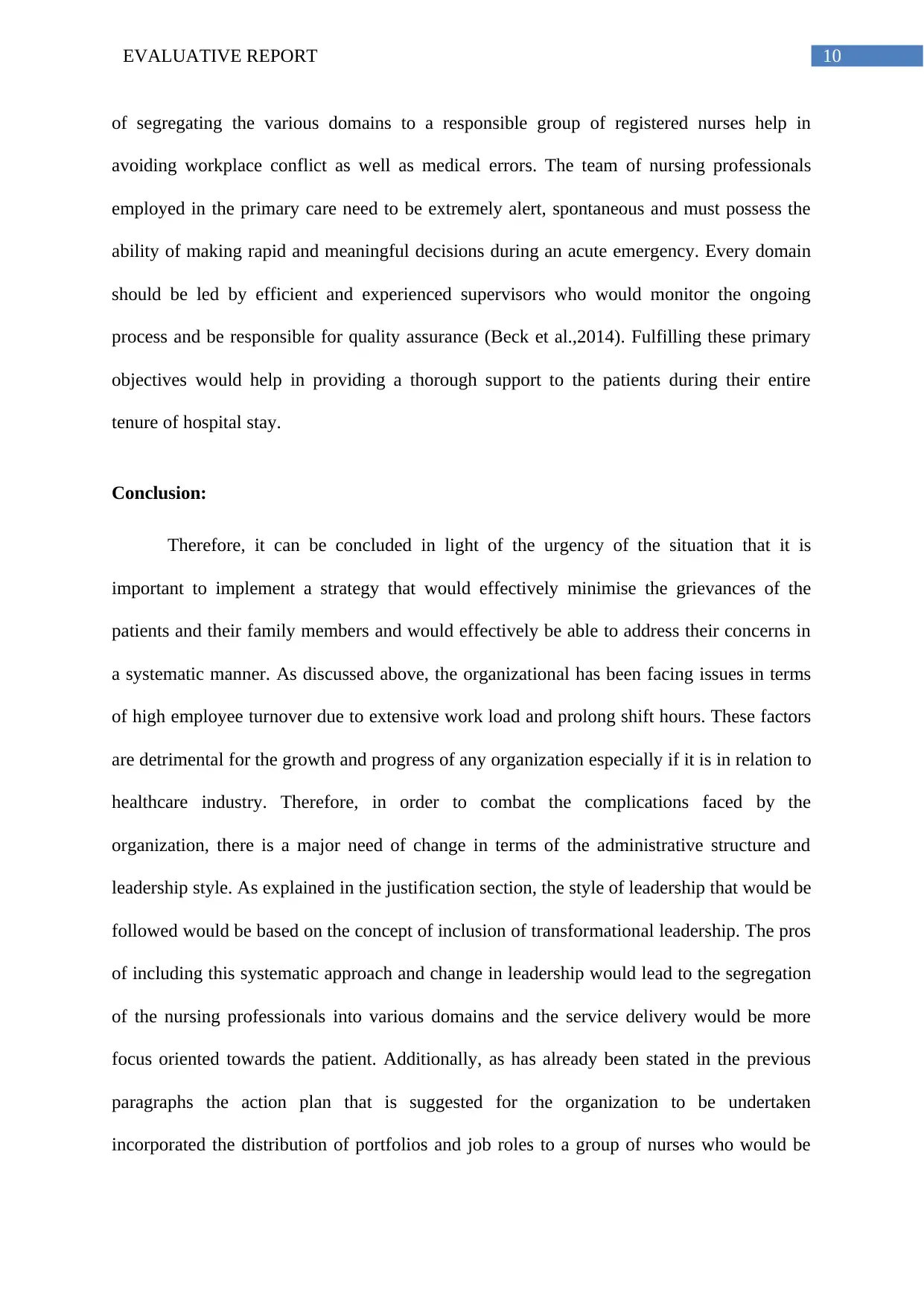
10EVALUATIVE REPORT
of segregating the various domains to a responsible group of registered nurses help in
avoiding workplace conflict as well as medical errors. The team of nursing professionals
employed in the primary care need to be extremely alert, spontaneous and must possess the
ability of making rapid and meaningful decisions during an acute emergency. Every domain
should be led by efficient and experienced supervisors who would monitor the ongoing
process and be responsible for quality assurance (Beck et al.,2014). Fulfilling these primary
objectives would help in providing a thorough support to the patients during their entire
tenure of hospital stay.
Conclusion:
Therefore, it can be concluded in light of the urgency of the situation that it is
important to implement a strategy that would effectively minimise the grievances of the
patients and their family members and would effectively be able to address their concerns in
a systematic manner. As discussed above, the organizational has been facing issues in terms
of high employee turnover due to extensive work load and prolong shift hours. These factors
are detrimental for the growth and progress of any organization especially if it is in relation to
healthcare industry. Therefore, in order to combat the complications faced by the
organization, there is a major need of change in terms of the administrative structure and
leadership style. As explained in the justification section, the style of leadership that would be
followed would be based on the concept of inclusion of transformational leadership. The pros
of including this systematic approach and change in leadership would lead to the segregation
of the nursing professionals into various domains and the service delivery would be more
focus oriented towards the patient. Additionally, as has already been stated in the previous
paragraphs the action plan that is suggested for the organization to be undertaken
incorporated the distribution of portfolios and job roles to a group of nurses who would be
of segregating the various domains to a responsible group of registered nurses help in
avoiding workplace conflict as well as medical errors. The team of nursing professionals
employed in the primary care need to be extremely alert, spontaneous and must possess the
ability of making rapid and meaningful decisions during an acute emergency. Every domain
should be led by efficient and experienced supervisors who would monitor the ongoing
process and be responsible for quality assurance (Beck et al.,2014). Fulfilling these primary
objectives would help in providing a thorough support to the patients during their entire
tenure of hospital stay.
Conclusion:
Therefore, it can be concluded in light of the urgency of the situation that it is
important to implement a strategy that would effectively minimise the grievances of the
patients and their family members and would effectively be able to address their concerns in
a systematic manner. As discussed above, the organizational has been facing issues in terms
of high employee turnover due to extensive work load and prolong shift hours. These factors
are detrimental for the growth and progress of any organization especially if it is in relation to
healthcare industry. Therefore, in order to combat the complications faced by the
organization, there is a major need of change in terms of the administrative structure and
leadership style. As explained in the justification section, the style of leadership that would be
followed would be based on the concept of inclusion of transformational leadership. The pros
of including this systematic approach and change in leadership would lead to the segregation
of the nursing professionals into various domains and the service delivery would be more
focus oriented towards the patient. Additionally, as has already been stated in the previous
paragraphs the action plan that is suggested for the organization to be undertaken
incorporated the distribution of portfolios and job roles to a group of nurses who would be
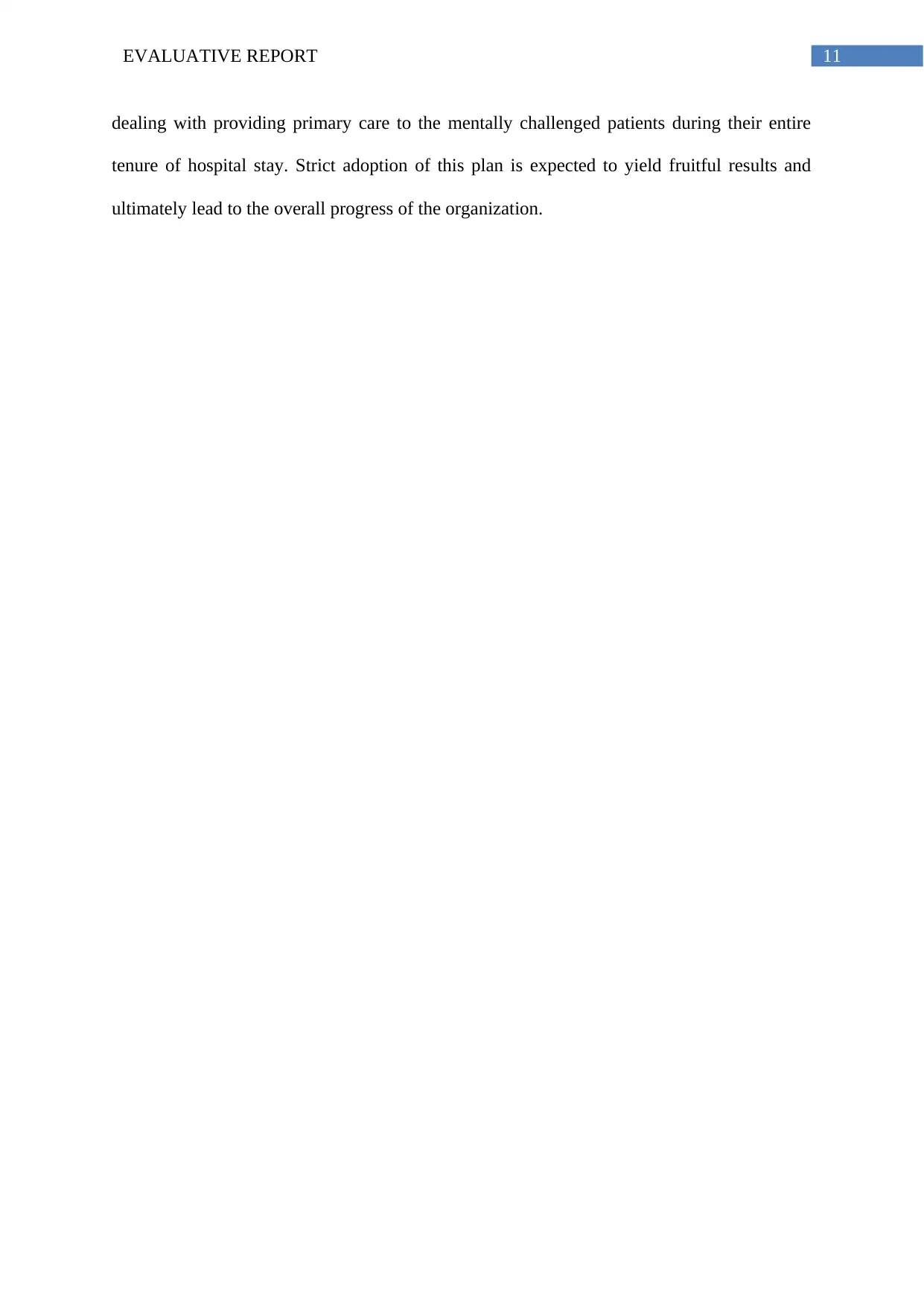
11EVALUATIVE REPORT
dealing with providing primary care to the mentally challenged patients during their entire
tenure of hospital stay. Strict adoption of this plan is expected to yield fruitful results and
ultimately lead to the overall progress of the organization.
dealing with providing primary care to the mentally challenged patients during their entire
tenure of hospital stay. Strict adoption of this plan is expected to yield fruitful results and
ultimately lead to the overall progress of the organization.
⊘ This is a preview!⊘
Do you want full access?
Subscribe today to unlock all pages.

Trusted by 1+ million students worldwide
1 out of 17
Related Documents
Your All-in-One AI-Powered Toolkit for Academic Success.
+13062052269
info@desklib.com
Available 24*7 on WhatsApp / Email
![[object Object]](/_next/static/media/star-bottom.7253800d.svg)
Unlock your academic potential
Copyright © 2020–2025 A2Z Services. All Rights Reserved. Developed and managed by ZUCOL.





